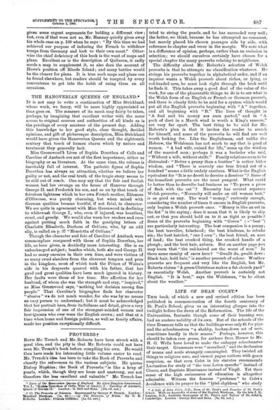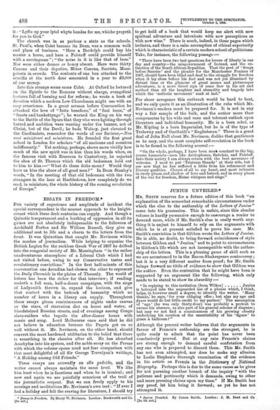LIFE OF DEAN COLET.*
Tins book, of which a new and revised edition has been published in commemoration of the fourth centenary of St. Paul's School, gives us an interesting glimpse into the twilight before the dawn of the Reformation. The life of the Universities, fantastic though some of their learning was, had an austere nobility of its own. But of the schools of the time Erasmus tells us that the buildings were only fit for pigs. and the schoolmasters "a shabby, broken-down set of men, sometimes hardly in their senses." Perhaps, however, this should be taken cum grano, for authors from Horace to Mr. H. G. Wells have loved to make the unhappy schoolmaster their target. Grammars were "moralised," and the declension of nouns and souls strangely commingled. They twisted all things to religious uses, and viewed pagan authors with grave suspicion, so that even Colet in his statutes recommends Lactantius for study of "the true Laten speeelie " instead of Cicero, and Baptista Mantuanus instead of Virgil. Yet their sense of the high seriousness of education is altogether admirable. Witness the famous "proheme " to Colet'a Accidence with its prayer to the " lytel chyldren " who study Cambridge. LondonGeorge Bell and Sons. [8s. SRL net.] .
• 4.;Life of John Cold, D.D., Dean of St. Paisl's and Pounder of St. Paid's , School. With an- Appendix of some of his Hnglish-Writings. By the late J. H. Liiptozt. D.D... forth ..Surrnaster of. St. and. Rellow of St. John's.
it : " Lyfte up your lytel whyte handes for me, whiche prayeth for you to God."
The church was in as parlous a state as the schools. St. Paul's, when Colet became its Dean, was a common walk and place of business. "Here a Bardolph could buy his master a horse, and here a Falstaff could provide himself with a servingman " ; "the noise in it is like that of bees." Nor were either drones or honey absent. Here were thirty Canons and their deputies, Minor Canons, Sacrists, Mass- priests in crowds. The contents of one box attached to the crucifix at the north door amounted in a year to 29,000 of our money.
Into this strange scene came Colet. At Oxford he lectured on the Epistle to the Romans without charge, evangelical lectures full of burning zeal for reform; he wrote a book of devotion which a modern Low Churchman might use with an easy conscience. In a great sermon before Convocation he attacked the love of " fatte benefices," of "foul lucre," of
feasts and bankettynge"; he warned the King on his way to the Battle of the Spurs that they who were fighting through hatred and ambition were warring under the banner, not of Christ, but of the Devil; he bade Wolsey, just elevated to the Cardinalate, remember the words of our Saviour,—Non veni ministrari sed ministrare. He founded the first great school in London for scholars "of all naciouns and countres indifferently." Yet nothing, perhaps, shows more vividly how much of the new spirit was in him than his words when, on the famous visit with Erasmus to Canterbury, he rejected the shoe of St. Thomas which the old bedesman held out to him to kiss :—" What do these dolts mean Would they have us kiss the shoes of all good men ? " In Dean Stanley's words, "In the meeting of that old bedesman with the two strangers in the lane at Harbledown, how completely do we read, in miniature, the whole history of the coming revolution of Europe."



























































 Previous page
Previous page